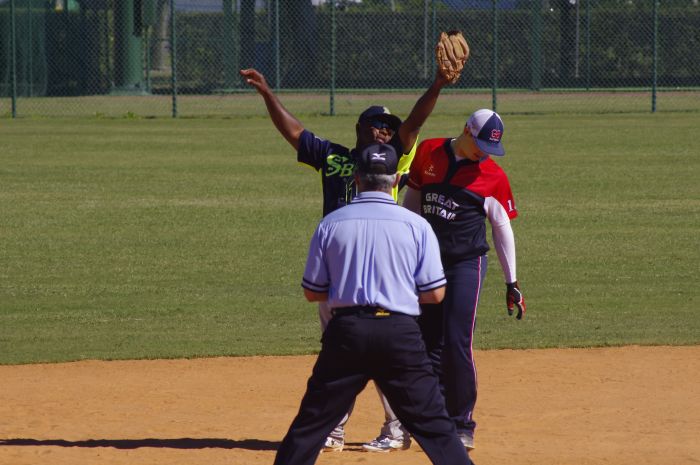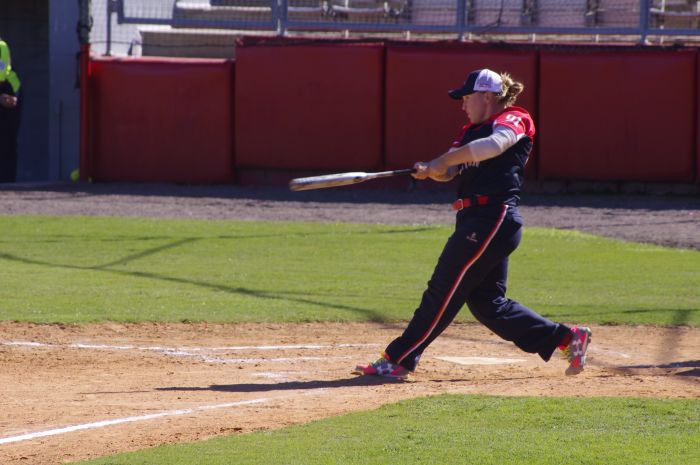 By Bob Fromer
By Bob Fromer
Plant City, Florida, USA: 20 November – The GB Slowpitch Team delivered an unbelievable offensive display on Sunday against Curacao to reach the final of the Slowpitch World Cup in Plant City, Florida – but then couldn’t quite sustain that level.
Great Britain destroyed Curacao, a team that had beaten them twice in the tournament, by a score of 33-13 in a four-inning mercy rule Page Playoff pre-final. GB sent 21 batters to the plate and scored 18 runs in a second inning that Head Coach Stephen Patterson thought might be the best offensive inning a GB team has ever played, especially given the opposition and what was at stake.
However, GB couldn’t maintain that standard in the final, and a very strong team from the Bahamas took the gold medal with a 22-11 win. It was the second straight Slowpitch World Cup triumph for the Bahamas, but last year’s win only happened because rain washed out a big German lead in the final and the medals were awarded on the basis of an earlier game. This time, the team from the Caribbean earned their victory.
The Bahamas’ big sluggers belted three balls out of Plant City Stadium in the final, but the killer blow was a grand slam home run by Sherman Ferguson in the third inning when they scored eight runs and pulled away to a lead that GB was never able to challenge. Ferguson ended the game with two doubles, two home runs and seven RBIs.
But for a GB Team with quite a few players who have never been in this environment before, their silver medals will be worn with pride, and the result represents a big step up from last year’s fourth place finish.
“I couldn’t have asked for any more from this team,” Stephen Patterson said after the final. “They gave all they could, and I’m only disappointed with the result.
“Sometime during the week,” Stephen added, “we created an atmosphere where the players realised they could do something fantastic here. In the end, it was a silver medal – but we came very close to more.”

Three games
Three games were played in the main stadium on the final day of competition on Sunday.
In the first of them, Germany took on Bulgaria in a game to decide fourth place -- but the Bulgarians were clearly not that bothered and Germany strolled to a 21-1 mercy rule win.
The second game was GB v Curacao, with the loser finishing third and the winner going on to the final. That game was a GB triumph, and if we had a Hall of Fame museum, the box score would be one of the main exhibits.
Then came the final, where GB never led, but managed to pull within two runs at the end of the second inning. But the Bahamas’ pulled away with an eight-run outburst in the top of the third inning, and that was more than GB was ever going to overcome.
The final tournament standings were:
1 – Bahamas
2 – GB
3 – Curacao
4 – Germany
5 – Bulgaria
6 – Turks and Caicos Islands
After the final, players from the Bahamas, GB and Curacao, along with many members of the German team, mingled on the field as the sun went down behind the main stand, taking group and team photos, dispensing hugs and handshakes, and showing the genuine warmth that this tournament has generated.
As the teams have played over the four days, discussions have gone on behind the scenes about what needs to be done to get more teams here next year and build up the event, and there now seems every chance that next year’s tournament will be an advance on this one.
But there has been a lot of good and exciting competition here among teams with very different styles, and that has made the 2016 Slowpitch World Cup, in the end, a success. A large vote of thanks goes to Laurie Gouthro and Laurie Nolan from the WBSC Softball Division for organising and running the event, and to Umpire Director Bob Stanton for organising an outstanding team of blues that included Chris Moon and Pete Saunders from BASU along with umpires from the US and Canada.
Here are more details – and some statistical oddities – from the pre-final and the final.
GB 33, Curacao 13
GB could have been forgiven some trepidation coming into this game. After beating Curacao on the first day of the tournament, GB had lost to them twice, and in yesterday’s playoff match-up, the British team had managed only five runs in six innings.
Which made what happened today all the more remarkable.
The game started out in a fairly normal fashion. Curacao batted in the top of the first inning, and cashed a walk to lead-off hitter Antersijn Sherwenne into a single run. There might have been more, but GB shortstop Jeff Swindell made a backhand stop in the hole and a strong throw to gun down Rhodine Martina, and then Jeff and Chris Yoxall closed out the frame with a 6-4-3 double play.
In the bottom of the first inning, Mike MacDowell, who went 9-for-10 in this game and the final, opened proceedings with an inside-the-park home run, and GB went on to score two more runs, both driven in by Jeff Swindell’s line drive single to right field.
One inning played, 3-1 to GB, nothing out of the ordinary.
Curacao then tied the game in the top of the second inning in typical Caribbean fashion, with a line drive home run over the left field fence by Zair Koeiman with a runner aboard.
Then came the bottom of the second inning, and a staggering burst of offense from the GB Team.
The best way to describe this inning is in numbers: 21 batters, 14 hits, five doubles, four triples, three home runs, four walks, three different Curacao pitchers and only one Curacao error. And the inning actually ended on a 6-4-3 double play.
But these were not bloop hits or ground balls finding holes. Most of the hits were line drives or balls hit over outfielders’ heads, including a particularly impressive triple to centre field by Danielle Atkinson that had the Curacao centre fielder running with his back to the infield as soon as she hit it.
The home runs came from Kelvin Harrison (over the fence) and Mike MacDowell (inside the park).
Of course, this kind of outburst should have ended the game as a contest – but it didn’t quite, because Curacao, to their credit, came in to bat after what must have seemed like hours in the field and put up eight runs of their own, including a long home run by Ulrich Snyders. That brought the score back to 21-11, and the game was only in the third inning.
But the British attack never stopped, and there were six more GB runs in the bottom of the third inning and another six in the fourth. The last of them, driven in by pinch-hitter David Grey, brought the margin to 20 runs and ended the game on the mercy rule.
Mike MacDowell, Kirstie Leach and Jeff Swindell each went 5-for-5, and Jeff hit for the cycle and led the onslaught with eight RBIs. Kelvin Harrison had four hits, including two home runs, and five RBIs, and Chris Yoxall had the patience to draw three consecutive walks.
But while GB batters piled up the statistics, the real statistical oddity was on the other side of the field, and it provided an extreme example of how slowpitch softball sometimes works.
During the four innings played, not a single male Curacao hitter made an out. Their five male batters went 13-for-13 plus a walk. But during those four innings, not a single female Curacao batter got a hit.
In the first, second and fourth innings, when no female Curacao batter reached base, and despite the fantastic batting performance by their men, Curacao scored one, two and two runs respectively.
In the third inning, however, when three of their five female hitters reached base – on a walk and two errors respectively -- Curacao scored eight runs.
And there endeth the lesson.
Bahamas 22, GB 11
The fear going into the final was always that GB would suffer a drop-off after the Curacao game, and that’s pretty much what happened – although the Bahamas are a better team than Curacao, and were better placed to take advantage.
Balls that had been line drives against Curacao tended to turn into fly balls in this game. There were more singles and fewer extra-base hits. And perhaps most crucially, the errors that had marked GB’s play on Day One returned in the final – eight errors in total that gave the Bahamas a bunch of unearned runs – though some of those errors may have been the result of a difficult late-afternoon sun in fielders’ eyes.
But the Bahamas committed only three errors, and two of them were minor, resulting in an extra base rather than an extra base runner.
GB had 18 hits while the Bahamas had 19 – but the Bahamas scored double the number of runs, and power was most of the reason. GB had just four extra-base hits, including their two home runs; the Bahamas had 10 extra-base hits, including their three round-trippers.
In short, GB was out-gunned in this game, and gave the Bahamas a helping hand.
It was the first time the Bahamas had ever beaten Great Britain. The British had won both of the round-robin encounters between the teams early in this tournament – the only two games that the Bahamas was to lose -- and GB had also inflicted the only defeat the Bahamas suffered in 2015.
So for the Caribbean team, this win couldn’t have come at a better time, and their emotions were clear to see after Chris Yoxall’s fly ball came down from the cloudless sky as the final out in the bottom of the seventh inning.
GB scored in six of the seven innings, but in ones and twos apart from a four-run outburst in the second inning built on Chris Yoxall’s three-run homer. The Bahamas scored in five of the seven innings, but that included six runs in the first inning and eight in the third, built around Sherman’s Ferguson’s grand slam home run, his second of the game.
Those eight runs came right after GB had narrowed the Bahamas’ lead to 8-6, and by creating a 10-run margin, served notice that the game was moving out of GB’s reach.
The rest of the contest was fairly even, and the final margin of victory for the Bahamas was 11 runs. But it felt like the writing was on the wall for GB long before the game was over.
Despite their failure to take the title, the GB players who were here will have enjoyed the softball, and will have learned from it. While GB and Germany are similar teams, all three of the Caribbean teams here presented different sorts of challenges.
And that should stand GB in good stead when – hopefully – they return to the World Cup in 2017 and finish one place higher.


